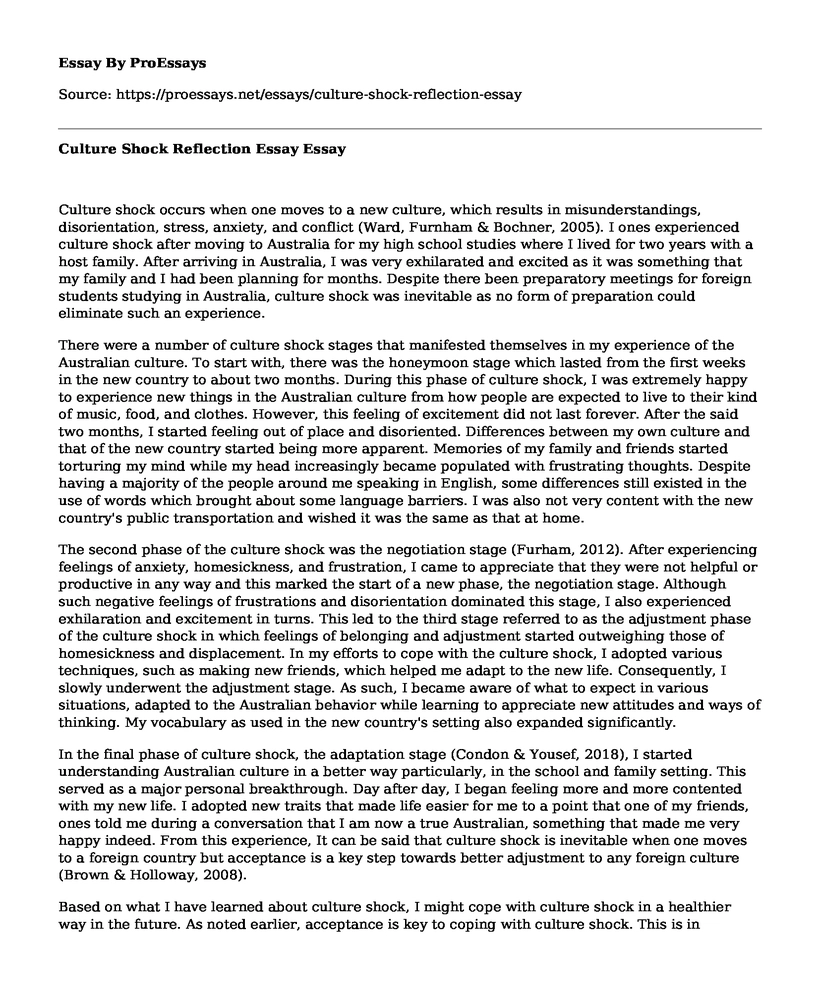Culture shock occurs when one moves to a new culture, which results in misunderstandings, disorientation, stress, anxiety, and conflict (Ward, Furnham & Bochner, 2005). I ones experienced culture shock after moving to Australia for my high school studies where I lived for two years with a host family. After arriving in Australia, I was very exhilarated and excited as it was something that my family and I had been planning for months. Despite there been preparatory meetings for foreign students studying in Australia, culture shock was inevitable as no form of preparation could eliminate such an experience.
There were a number of culture shock stages that manifested themselves in my experience of the Australian culture. To start with, there was the honeymoon stage which lasted from the first weeks in the new country to about two months. During this phase of culture shock, I was extremely happy to experience new things in the Australian culture from how people are expected to live to their kind of music, food, and clothes. However, this feeling of excitement did not last forever. After the said two months, I started feeling out of place and disoriented. Differences between my own culture and that of the new country started being more apparent. Memories of my family and friends started torturing my mind while my head increasingly became populated with frustrating thoughts. Despite having a majority of the people around me speaking in English, some differences still existed in the use of words which brought about some language barriers. I was also not very content with the new country's public transportation and wished it was the same as that at home.
The second phase of the culture shock was the negotiation stage (Furham, 2012). After experiencing feelings of anxiety, homesickness, and frustration, I came to appreciate that they were not helpful or productive in any way and this marked the start of a new phase, the negotiation stage. Although such negative feelings of frustrations and disorientation dominated this stage, I also experienced exhilaration and excitement in turns. This led to the third stage referred to as the adjustment phase of the culture shock in which feelings of belonging and adjustment started outweighing those of homesickness and displacement. In my efforts to cope with the culture shock, I adopted various techniques, such as making new friends, which helped me adapt to the new life. Consequently, I slowly underwent the adjustment stage. As such, I became aware of what to expect in various situations, adapted to the Australian behavior while learning to appreciate new attitudes and ways of thinking. My vocabulary as used in the new country's setting also expanded significantly.
In the final phase of culture shock, the adaptation stage (Condon & Yousef, 2018), I started understanding Australian culture in a better way particularly, in the school and family setting. This served as a major personal breakthrough. Day after day, I began feeling more and more contented with my new life. I adopted new traits that made life easier for me to a point that one of my friends, ones told me during a conversation that I am now a true Australian, something that made me very happy indeed. From this experience, It can be said that culture shock is inevitable when one moves to a foreign country but acceptance is a key step towards better adjustment to any foreign culture (Brown & Holloway, 2008).
Based on what I have learned about culture shock, I might cope with culture shock in a healthier way in the future. As noted earlier, acceptance is key to coping with culture shock. This is in accordance with Winkelman's (cited in Condon & Yousef, 2018) argument that people have a tendency to deny that they are experiencing culture shock and insists that one should accept their problems in a foreign country are as a result of culture shock. Thus, my first step when faced with culture shock in the future is to accept that indeed I am experiencing the phenomenon. By accepting my situation, I would then be positive and view every new thing I experience in the new country positively. In conclusion, although culture shock is deemed inevitable, there are various strategies for managing it and this include acceptance as the first step.
References
Brown, L., & Holloway, I. (2008). The initial stage of the international sojourn: excitement or culture shock?. British Journal of Guidance & Counselling, 36(1), 33-49.
Condon, J., & Yousef, F. (2018). Acculturation, Culture Shock and Intercultural Competence. SAGE.
Furham, A. (2012). Culture shock. Revista de Psicologea de la Educacion, 7.
Ward, C., Furnham, A., & Bochner, S. (2005). The psychology of culture shock. Routledge.
Cite this page
Culture Shock Reflection Essay. (2022, Jun 06). Retrieved from https://proessays.net/essays/culture-shock-reflection-essay
If you are the original author of this essay and no longer wish to have it published on the ProEssays website, please click below to request its removal:
- Chushingura's Women and Family Essay
- Biography and Successes of Jeff Bezos Paper Example
- Essay Sample on Eating Disorders: Evolutionary Changes in Feeding Habits
- Schizophrenia: Case Study
- America's Diversity: Uniting and Divisive Forces - Essay Sample
- Review of Mindfulness and Centering Prayer: A Comparison of Effects on Stress Reduction
- Free Essay Example on Social Media Addiction: Impact on Mental Health & Habits







